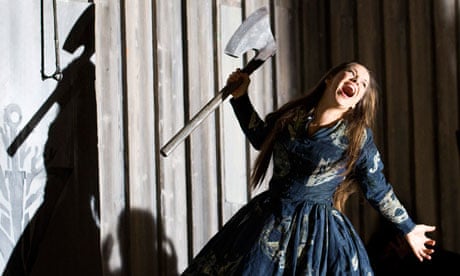Bellini's opera Norma is often regarded as the pinnacle of the bel canto period, when the virtuoso potential of the human voice stood unchallenged as the expressive centre of the medium. Its title role of the Druid priestess who has betrayed her people and her religion, only to be betrayed in turn by her Roman lover, is regularly cited as the most demanding in the entire repertory. From a purely practical point of view, its sheer length and assault course-like nature make it a supremely taxing assignment.
Vital to the success of Christopher Alden's new production for Opera North is the priestess of Dutch soprano Annemarie Kremer. Her ample, wide-ranging voice keeps faith with Bellini's notes, maintaining dramatic intensity via seriousness of artistic purpose and commitment. As her guilt-ridden rival, Adalgisa, Keri Alkema provides sterling support, as does James Creswell, whose resplendent bass gives striking presence to Norma's troubled father, Oroveso. Less consistent is Mexican Luis Chapa as her errant lover, Pollione, though his big, beefy tenor is along the right lines. As the dour cultists who revere Norma as a direct agent of the divine, Opera North's chorus are scarily stern, while conductor Oliver von Dohnányi brings energy and finesse to Bellini's deceptively simple accompaniments.
Alden is not a director who obediently follows the book. The libretto's Romano-Gallic conflict disappears, to be replaced by something altogether less tangible. Sue Willmington's costumes suggest a mid-19th-century rural community exploited by wealthy landowners. Charles Edwards's imposing, barn-like set encloses an enormous tree trunk inscribed with pagan symbols, where Norma and Pollione meet their fiery fate. But the specifics matter less than the vividness with which the principals chart the opera's complex, constantly shifting emotional layout. Alden strays a long way from the text – this is presumably the first production of the opera in which Pollione's sidekick Flavio (Daniel Norman) is castrated by Norma's confidante, Clotilde (Gweneth-Ann Jeffers) – yet scene after scene pierces to the core of the drama, and there are moments when the evening touches greatness.

Comments (…)
Sign in or create your Guardian account to join the discussion